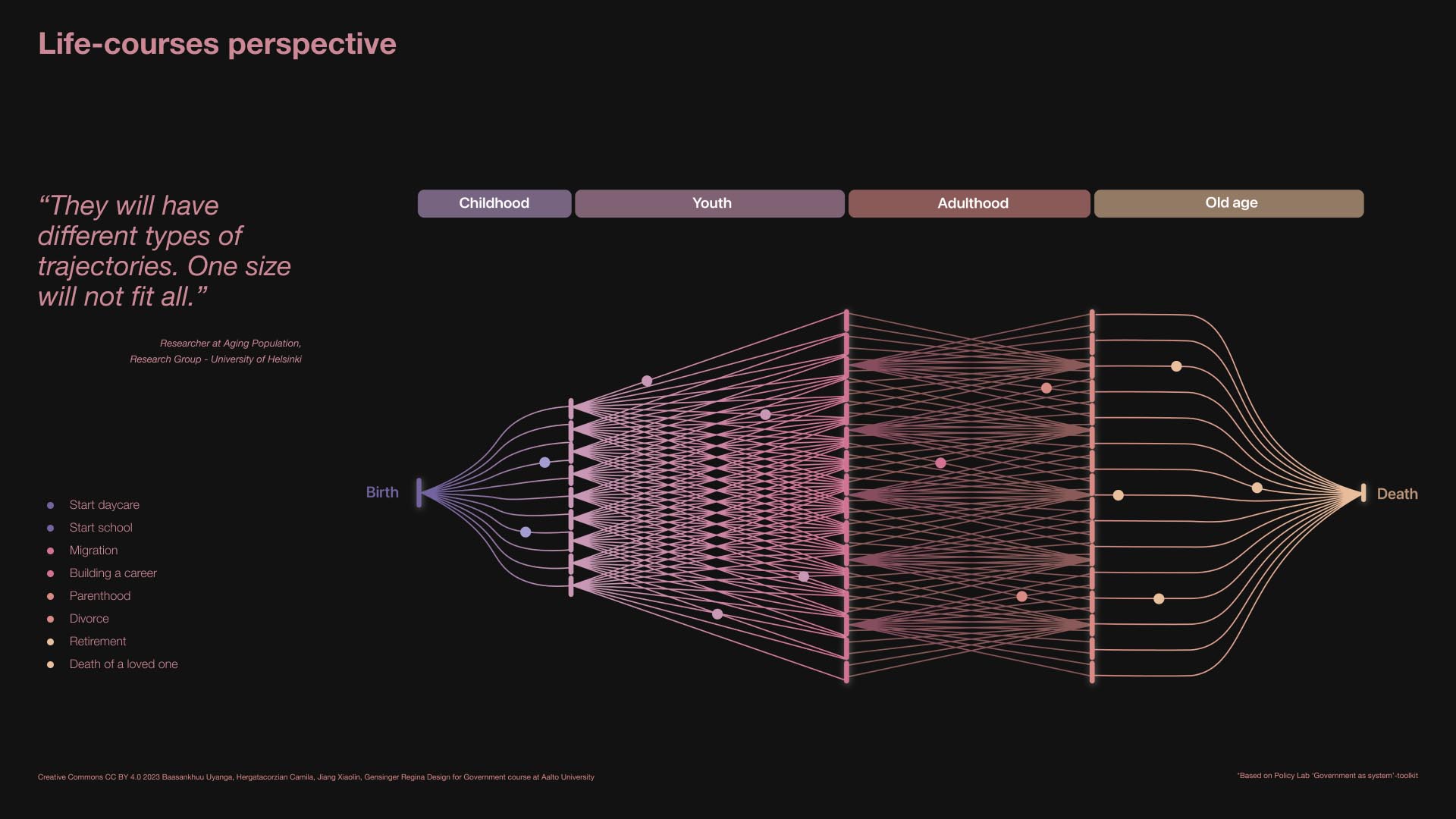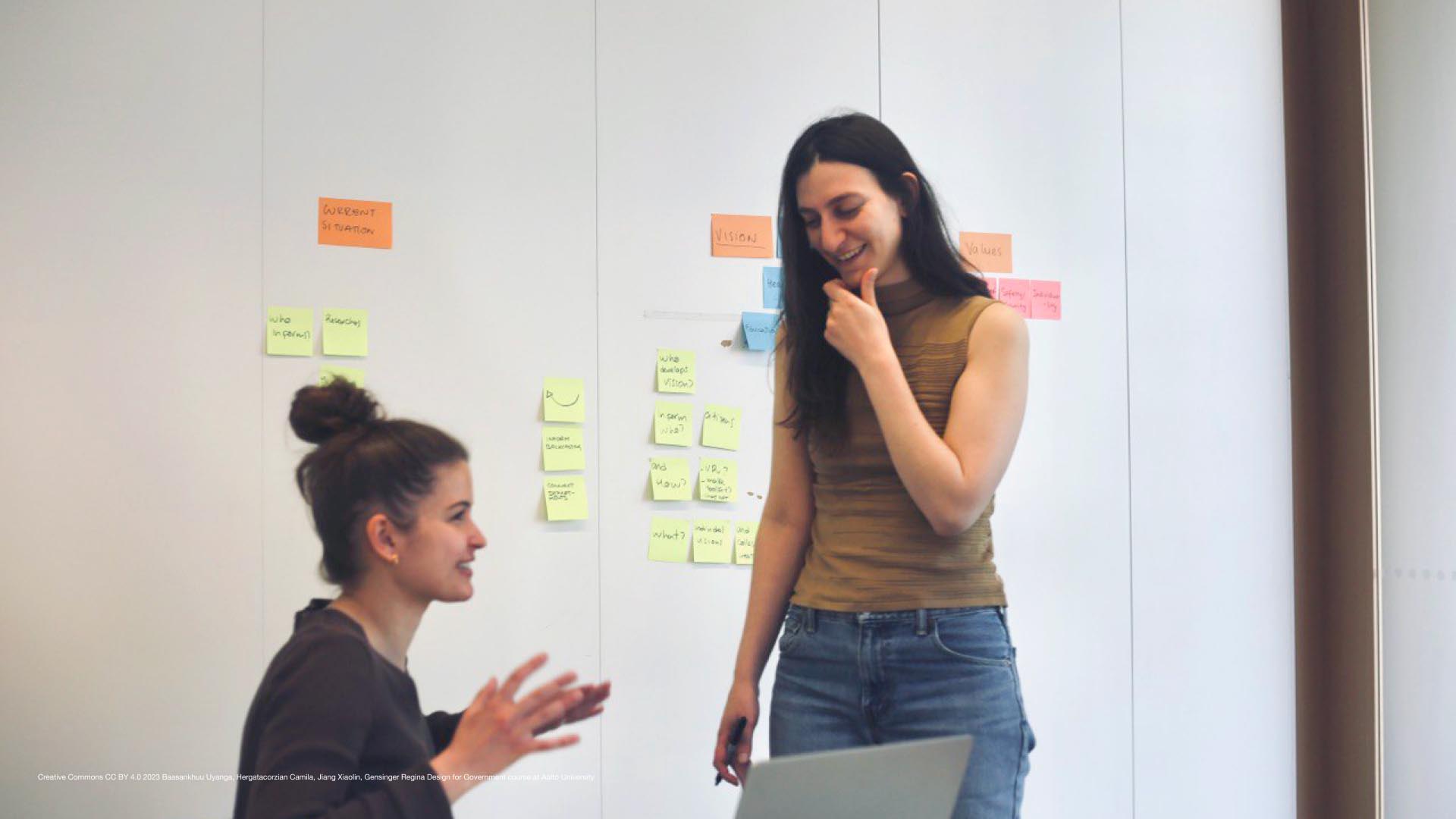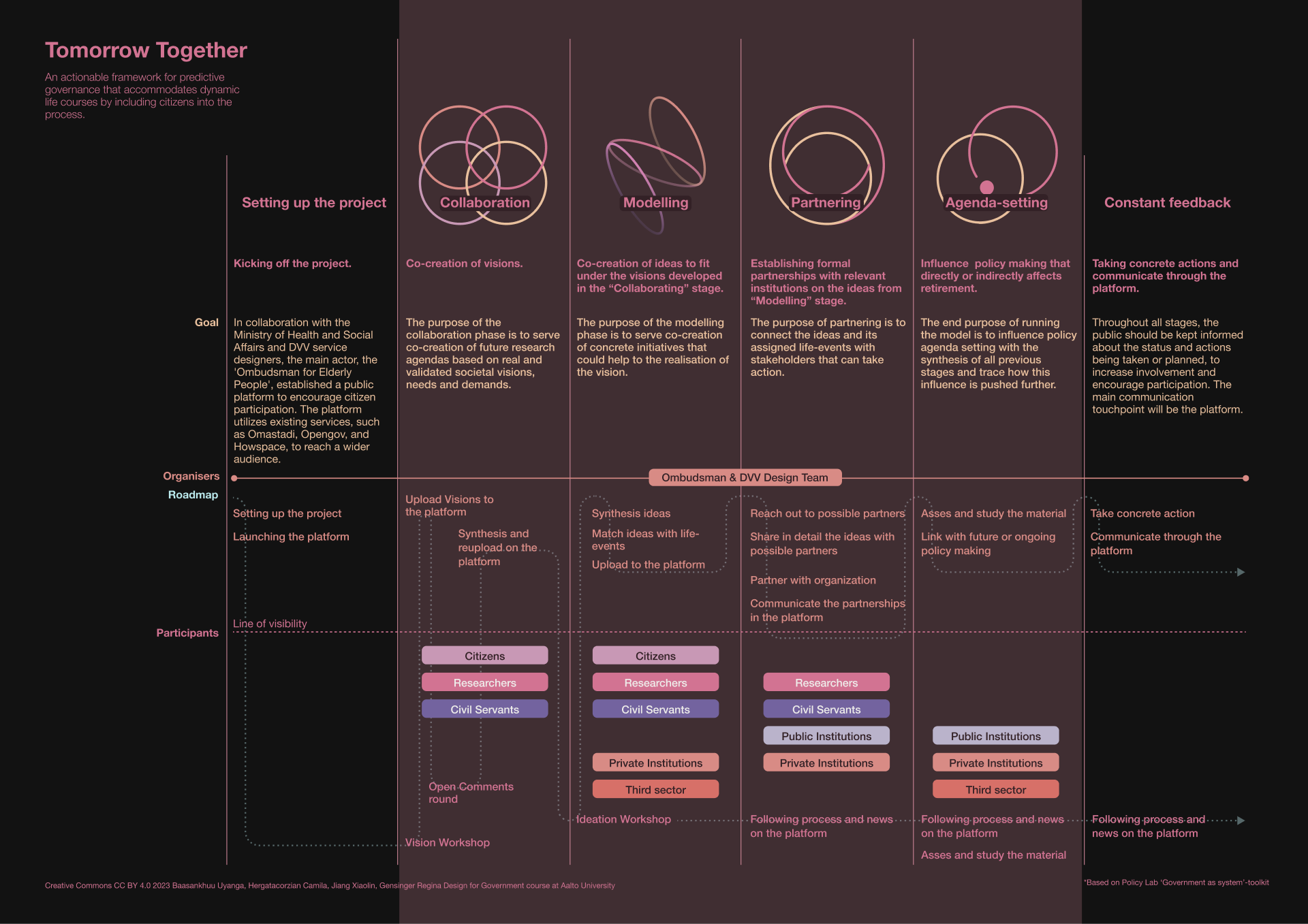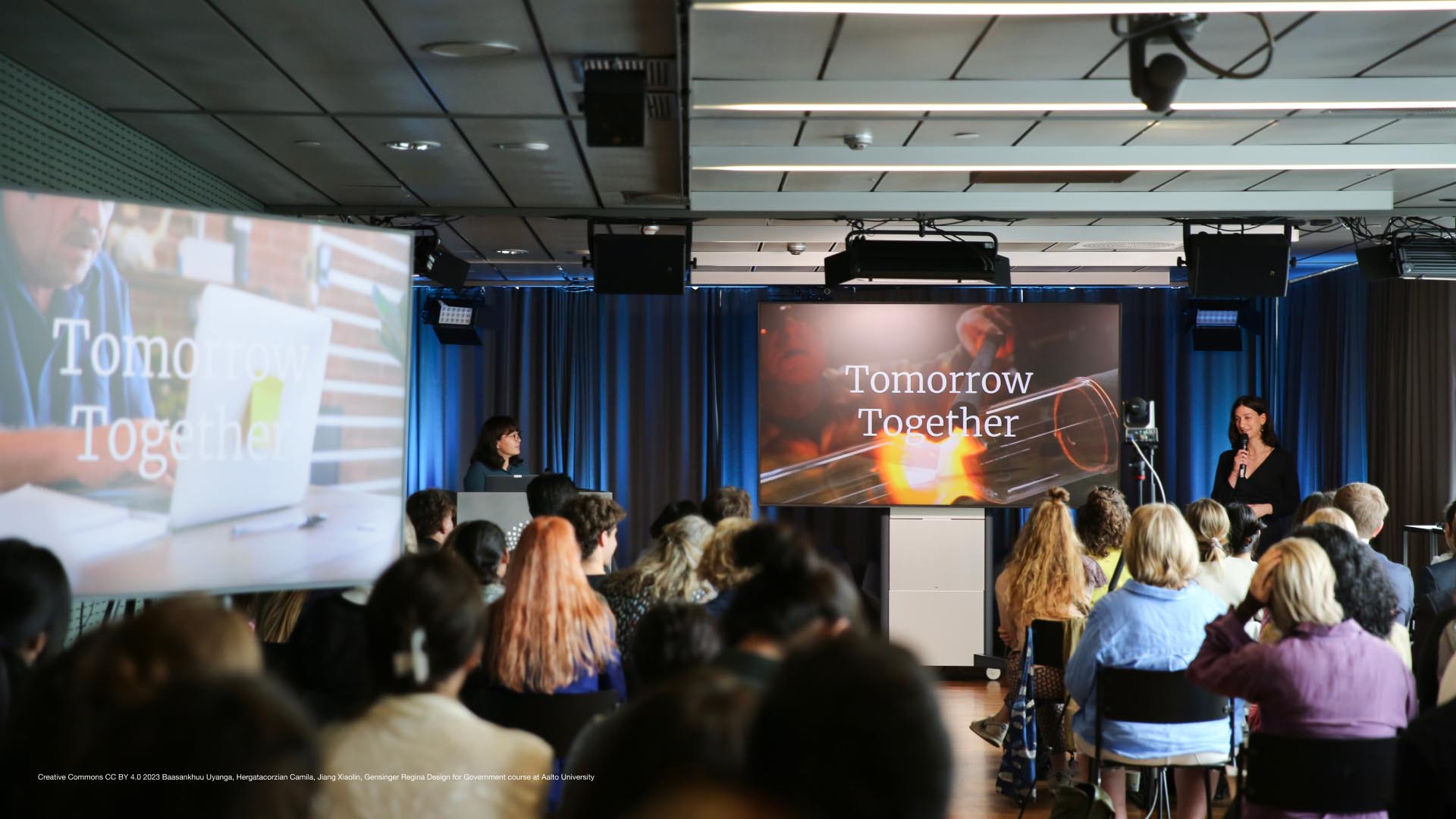A four stages-framework that adopts a life course perspective through predictive governance and multi-party collaboration into policy making.
This blog post reports on work-in-progress within the DfG course! The post is written by group 1B working in collaboration with the Digital Population and Data Services (DVV) and the Ministry of Finance (VM) on the project ‘Life events for a dignified old age’. The group includes Uyanga Baasankhuu from Collaborative and Industrial Design program, Xiaolin Jiang from Human Computer Interaction program, Regina Gensinger from Creative Sustainability program, and Camila Hergatacorzian from Collaborative and Industrial Design program.
Written by: Regina Gensinger
Our focus these recent months has been on answering one question: how can we design life events for a dignified old age?
In collaboration with DVV and the Ministry of Finance, we explored the trends surrounding Finland’s diverse and ageing population. Through expert interviews, a questionnaire with citizens, secondary research, and co-creation, we developed a proposal for a new perspective on policy-making.
Let this overview be your inspiration to a world where we embrace dynamic life courses and in which citizens take part in multi party collaborations and predictive governance.
One size does not fit all
“[An] individual’s life course plays a detrimental role in perceiving retirement in one‘s life. The retirement event is quite a positive event for individuals (…) whereas it might be the opposite for others (…)They will have different types of trajectories. One size will not fit all.”
– Researcher at Aging Population, Research Group – University of Helsinki, 2023

One insight stood out to us: life is becoming more dynamic and the population more diverse. We are moving away from a model of the lifespan in which education occurs primarily in youth, paid work dominates the middle years, and leisure is destined to retirement (Laura Carstensen by Anne Tergesen, 2022).
Events that occur at one point in time can have an impact on events and transitions later on. This means that almost any individual decision can have long-term consequences for one’s life course (D. Anxo, G. Bosch, J. Rubery, 2010). Even more so, the current retirement system is not accommodating increased individuality Characterised by life courses that become more dynamic than ever before.
Collaboration and predictive governance are needed
“One cannot influence population ageing by addressing older individuals only. […] Consequently, policies on population ageing should consider the situation of individuals of all ages – youths, middle-agers, and older individuals.”
– Komp, K., & Johansson, S., 2016
To accommodate dynamic life courses, we need governance that is predictive rather than reactive. This will enable us to provide the services that the future elderly generation will require. The main design question we asked ourselves in recent weeks was how to inform a predictive governance strategy. We needed to voice and visualize the diverse trajectories of life.

After several iterations, we proposed a multi-party collaboration in which citizens, researchers, and civil servants influence policymaking together. The ownership of this collaboration lies within public institutions.
This approach could have an interesting effect on the so-called “Finish paradox.” This paradox states that while trust in public institutions and satisfaction with democracy are high, the percentage of people who believe they can influence political processes is low compared to countries with similar levels of trust (OECD, 2021). Our proposal to collaborate opens up the possibility of experimenting to see if trust increases by purposefully including citizens and keeping them informed through a designated platform where processes and decisions are transparently shared.
A proposal to accommodate dynamic life courses in policy making
Tomorrow Together is our proposed model to adopt a life course perspective in policy making. A great source of inspiration was Policy Lab’s “Government as a System” toolkit (Andrea Siodmok, Gov.uk, 2020).
The model is clustered into four steps to inform policy-making on the life events of a dignified old age: Collaborating, Modelling, Partnering, and Agenda-setting.

The ownership of the model lies with the Ombudsman for Elderly People, in partnership with the Ministry of Health and Social Affairs, as well as service designers at DVV.
Project owners make use of various existing platforms, such as Omastadi, OpenGov, and Howspace, to connect with citizens about their retirement vision. During the collaboration stage, citizens are invited to participate in workshops where they can create their own visions with the support of researchers, service designers and civil servants. To ensure a broad range of life experiences, we value diversity and select citizens from a variety of socio-demographic backgrounds. The output of the vision workshops addresses a range of retirement scenarios, which are published on the platform to initiate public discussions. The comments are synthesized and integrated into the final visions for retirement.
Those visions build the foundation for the modeling stage. The goal in this phase is to co-create ideas that align with the visions developed in the “Collaborating” stage. This stage also calls for a second round of participation.
Based on that, formal partnerships are established with relevant institutions based on the ideas that have evolved in the previous stage. The purpose is to connect the ideas and their assigned life events with stakeholders who can take action.
With that, the agenda gets set on how to influence policy-making that directly or indirectly affects retirement.

The ultimate goal of running the model is to influence the policy agenda by synthesizing all previous stages and tracing how this influence is pushed forward. By taking a comprehensive approach, the model can help to create a more nuanced and informed policy agenda that reflects the needs and perspectives of all relevant stakeholders.
The vision of a people-oriented, proactive society
“A people-oriented, proactive society will be able to provide the best possible circumstances for people to take care of their own wellbeing and that of their family during different life events.”
– Ministry of Finance Finland, 2017
We propose a four-stage model for predictive governance that takes into account dynamic life courses. A crucial aspect of our model is multi-party collaboration, with a particular emphasis on citizen involvement. Our approach aims to address the “Finnish paradox” by building trust in citizens’ self-efficacy and input into policymaking. With this in mind, we introduce a framework that creates a future that accommodates the dynamic and individualistic lives of all individuals.
If you’re interested in learning more about Tomorrow Together, visit our project page here: https://dfg-course.aalto.fi/2023/life-event-services-for-a-dignified-old-age/
References:
Researcher at Aging Population, Research Group – University of Helsinki. (2023). Interview. Helsinki
Laura Carstensen, Director of Stanford University’s Center on Longevity by Anne Tergesen. (2022). “What Old Age Might Be Like for Today’s 30-Year-Olds”. Wall street journal. https://www.wsj.com/articles/old-age-in-the-future-11668610227
Anxo, Dominique & Bosch, Gerhard & Rubery, Jill. (2010). Shaping the Life Course: A European Perspective. 10.4337/9781849806381.00006.
Komp-Leukkunen, Kathrin & Johansson, Stina. (2015). Population ageing in a lifecourse perspective: developing a conceptual framework. Ageing and Society. -1. 1-24. 10.1017/S0144686X15000756.
OECD (2021), Drivers of Trust in Public Institutions in Finland, Building Trust in Public Institutions, OECD Publishing, Paris, https://doi.org/10.1787/52600c9e-en.
Andreas Iodmok (2020). ‘Government as a System’ toolkit. Gov.uk. https://openpolicy.blog.gov.uk/2020/03/06/introducing-a-government-as-a-system-toolkit/
Ministry of finance Finland (2017). A people-oriented, proactive society. https://vm.fi/en/people-oriented-proactive-society
The DfG course runs for 14 weeks each spring – the 2023 course has now started and runs from 27 Feb to 31 May. It’s an advanced studio course in which students work in multidisciplinary teams to address project briefs commissioned by governmental ministries in Finland. The course proceeds through the spring as a series of teaching modules in which various research and design methods are applied to address the project briefs. Blog posts are written by student groups, in which they share news, experiences and insights from within the course activities and their project development. More information here about the DfG 2023 project briefs.

